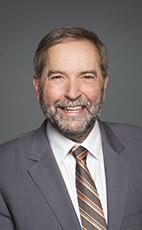Mr. Speaker, today we pay tribute to the extraordinary member for Sturgeon River—Parkland and interim leader of the Conservative Party for her service as a member of Parliament, as a minister, and as leader of the official opposition and thank her for the honour, integrity, and passion she has brought to this House over the years.
We learned last night that not only will the member be handing over the reins to a new leader, she will also be stepping down as MP. That news was met with an outpouring of recognition and tremendous gratitude, and rightly so. She will be missed as an MP and as a great leader of the Conservative Party—my personal favourite, for the record.
In less than two weeks, a new Conservative leader will be chosen. We do not know who that will be, but we do know it will not be Kevin O'Leary. I guess for that, at least, we can be thankful.
I thought today I would tell a story that demonstrates why the member for Sturgeon River—Parkland is so widely respected. This House is often filled with passionate debate and disagreement, as it should be. As opposition leaders of often diametrically opposed parties, we frequently have very different perspectives on issues, but sometimes we can find common ground and bypass party differences for the greater good. In March, the leader of the official opposition and I, and ultimately all members of this House, were able to come together and do just that.
A series of shocking decisions showed us once again that our legal system does an abysmal job of addressing cases of sexual assault and protecting the victims. The Halifax ruling made it clear that appropriate sexual assault training for judges was not only necessary, but had become urgent.
The Criminal Code stipulates that no consent is obtained where the complainant is incapable of consenting to the activity. This ruling went completely against the Criminal Code and it became clear that it was necessary to act quickly on this.
The member had introduced legislation, Bill C-337, that would require judges undergo comprehensive training in sexual assault law. I was very impressed with the proposed bill. It is an important step forward for survivors of sexual assault who are struggling in a judicial system that far too often fails them.
It was clear to me that the legislation should receive unanimous support, not only due to the urgency of the problem but also because at that moment in particular, it was critically important that every member of the House come together and say “we believe survivors”.
We reached out to the member and her office and offered to endorse the bill and fast-track it to committee by proposing unanimous consent. That unanimous consent was forthcoming.
It is rare for all leaders of political parties to support each other's legislation and even more rare for leaders to propose unanimous consent for each other's legislation. However, when it comes to how our judicial system handles cases of sexual assault, I am so proud to say that members of the House unanimously agreed to put survivors first.
Quite sincerely, I thank the leader of the official opposition for the tremendous work she did for this bill. I know that this goes back to the hon. member's university days when she took part in a project that looked into how sexual assault complainants were treated in the courts. I know how important this is to her and I am extremely honoured that the House passed the bill yesterday.
I thank the hon. member for being so open to working in a collaborative and non-partisan way. That is what made possible this important accomplishment. I will always be very proud of this moment and I hope she will be as well. I can safely say that the leadership that the hon. member for Sturgeon River—Parkland showed in the House certainly earned her the respect of the entire NDP caucus.
In closing, Catherine and I wish my colleague, the leader of the official opposition, her family and her wonderful spouse, J.P., many years of peace and happiness together.

